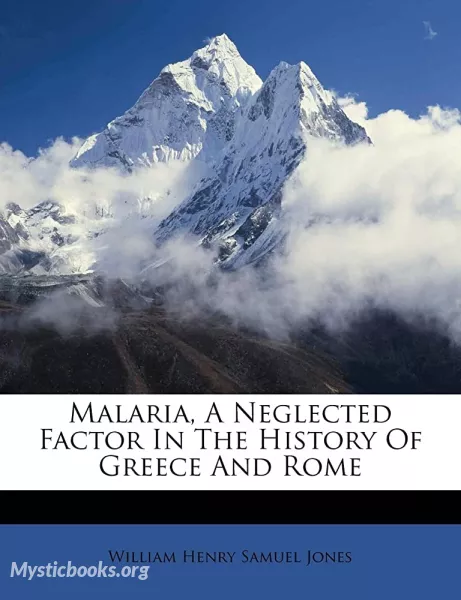
Malaria: A Neglected Factor in the History of Greece and Rome
'Malaria: A Neglected Factor in the History of Greece and Rome' Summary
"Malaria: A Neglected Factor in the History of Greece and Rome" is a pioneering book written by William Henry Samuel Jones, first published in 1907. This book is a comprehensive study of the impact of malaria on the ancient civilizations of Greece and Rome. Jones' work is a landmark study of the disease's historical and cultural significance, providing a detailed account of the devastation caused by malaria in ancient times.
Jones begins his book by setting the historical context of malaria in the ancient world, highlighting its impact on society, politics, and the economy. He meticulously traces the evolution of the disease from its earliest appearance in Greece and Rome to its eventual decline in the medieval period. Jones argues that malaria was a major contributor to the decline of these great empires and that its impact was far-reaching and long-lasting.
One of the key strengths of Jones' book is his use of a variety of sources to piece together a detailed picture of the prevalence and impact of malaria in ancient times. He draws on ancient literature, medical texts, and archaeological evidence to build a rich and complex understanding of the disease's historical and cultural significance. For instance, he explores the cultural beliefs and superstitions surrounding the disease, as well as the role of medicine and public health interventions in combating it.
Jones also devotes significant attention to the social and economic impact of malaria. He argues that the disease had a significant impact on the labor force and agricultural productivity, leading to economic decline and social upheaval. He also examines the role of malaria in the decline of military power, highlighting how outbreaks of the disease weakened armies and led to military defeats.
Despite its focus on the ancient world, "Malaria: A Neglected Factor in the History of Greece and Rome" has contemporary relevance. Malaria remains a major public health threat in many parts of the world, particularly in sub-Saharan Africa, and Jones' work serves as a reminder of the importance of ongoing efforts to combat the disease. Furthermore, Jones' study of the historical and cultural significance of malaria highlights the critical role that history can play in informing current public health policies and interventions.
In conclusion, "Malaria: A Neglected Factor in the History of Greece and Rome" is a seminal work of scholarship that provides a comprehensive understanding of the impact of malaria on ancient Mediterranean civilizations. Jones' meticulous research, combined with his engaging writing style, makes this book an essential read for historians, public health professionals, and anyone interested in the intersection of medicine and history.
Book Details
Language
EnglishOriginal Language
EnglishPublished In
1907Genre/Category
Tags/Keywords
Authors
William Henry Samuel Jones
British
William Henry Samuel Jones was a British writer, translator, and academic. He was nicknamed Malaria Jones, because of his theory that malaria was instrumental in the downfall of the classical civiliza...
Books by William Henry Samuel JonesDownload eBooks
Listen/Download Audiobook
- Select Speed
Related books

National Geographic Magazine Vol. 08 - 01. January 1897 by National Geographic Society
This issue of National Geographic Magazine, published in January 1897, encompasses a wide range of geographical topics. It features articles on the Go...

Minor Works of Josephus by Flavius Josephus
There are 3 parts to this collection. Against Apion is a two-volume defence of Judaism as classical religion and philosophy, stressing its antiquit...

The World’s Famous Orations, Vol. III: Great Britain - I by William Jennings Bryan
The World’s Famous Orations, Vol. III: Great Britain - I is a collection of speeches by some of the most famous orators in British history. It is a mu...

Old Coast Road From Boston to Plymouth by Agnes Edwards
This book, written in 1920, takes the reader on a delightful journey along the Old Coast Road from Boston to Plymouth, Massachusetts. Agnes Edwards p...

Libro II de la Historia de Heródoto by Herodotus
This book is the second volume of Herodotus' Histories, a seminal work of Greek historiography. Written in the 5th century BCE, the Histories provide...

Drugging a Nation by Samuel Merwin
Drugging a Nation is a journalistic reveal of the extent to which the British Empire was culpable in the dissemination and subsequent near total addic...

Martyrdom of Man by William Winwood Reade
The Martyrdom of Man, written by William Winwood Reade in 1872, is a comprehensive and expansive work exploring the history of humanity from a secular...

Organic Evolution by Richard Swann Lull
Richard Swann Lull's "Organic Evolution" is a classic textbook that presents the fundamental principles of biological evolution. The book explores the...

Coming People by Charles F. Dole
In "Coming People," Charles F. Dole argues that the "survival of the fittest" is not the only driving force of evolution. He believes that kindness, g...

The Chronicles of America Volume 05 - Pioneers of the Old South by Mary Johnston
"Amidst the untamed wilderness and the echoes of history, pioneers of a bygone era carve their destiny in the Old South. Delve into the enthralling sa...
Reviews for Malaria: A Neglected Factor in the History of Greece and Rome
No reviews posted or approved, yet...